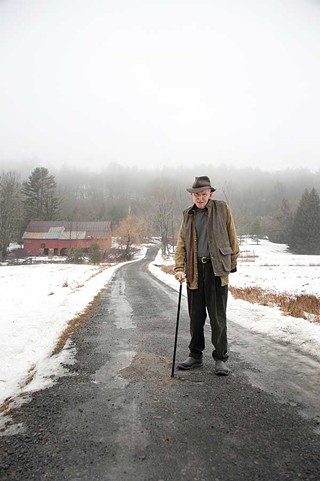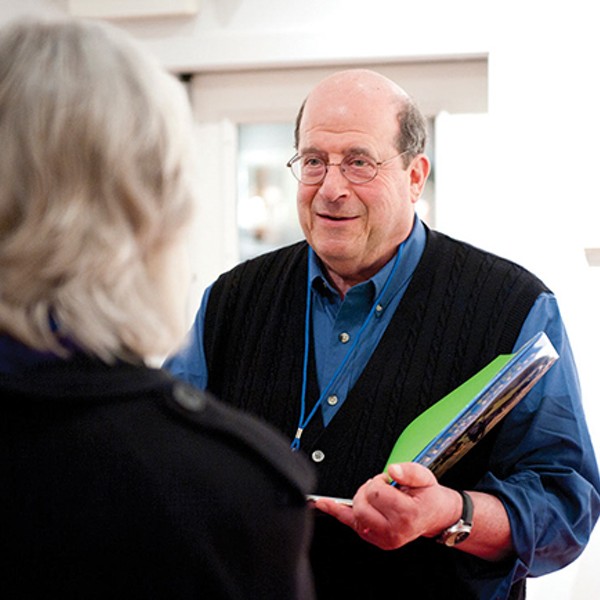He writes seven days a week, rising at 6am to work three or four hours. Writing, he says, is its own reward. "If I've got one reader, it's a miracle. If I've got two, it's a groundswell. If I've got three, it's a mass movement."
154. I wear many hats, but they're all cocked at an angle.
With a family to support, Perkins interspersed his own work with assignments. By his reckoning, he's published over a million words of journalism, including criticism in The Nation, American Book Review, Mother Jones, and a long-running stint as book editor of a libidinous underground magazine. "I had a page to myself for 30 years," he reports. "I wrote about classic literature, great novels, Philip Roth." More than 100 of these columns are collected in his 1994 book The Good Parts: An Uncensored Guide to Literary Sexuality (RK, 1994); authors discussed include John Updike, Jerzy Kosinski, John Hawkes, Anais Nin, Mark Twain, and Honey Bruce. From the introduction: "Focusing on Eros is one of the many ways to focus on life, and because this perspective is usually forbidden, perhaps the sweetest."
89. Blessed to be here in this body of incarnate delight, this cloud of consummate bliss, inside this lightly perspiring golden skin.
Perkins's other books include The Secret Record: Modern Erotic Literature (William Morrow, 1976), alongside science fiction, steamy paperbacks, novelizations of movies, a ghost-written memoir for Melvin Van Peebles, and a second collaboration with Nixon, The Pocket Guide to Woodstock (Bushwhack, 2012).
"Michael is one of a rapidly dwindling breed, the kind of writer who used to be referred to as a 'man of letters,'" says poet Mikhail Horowitz, a friend of several decades. "The practice of reading and writing informs his entire life, and he's equally adept at writing poems, essays, novels, erotica, art and literary criticism, even guide books. Each wrinkle and crease in his beloved Catskills landscape summons up a literary allusion; hiking, for him, is above all else an act of reading."
A self-described "neo-Luddite," Perkins eschews e-mail and only started using an iPad in recent months, when he lost too much use of his hands to work on a manual typewriter. "I hate it, but I Google," he admits. But he misses the percussion and permanence of typewritten text. "You feel like a craftsperson, like you're making something. You're banging the letters right into the paper."
He asserts that the discipline of retyping a manuscript leads to more rigorous editing. "If you use a word processor, you get processed words. It's too easy. I'd rather retype it again and again and again. But now I can't." He shrugs.
137. Having a neurological disease like Parkinson's is like dancing each day with a new and sadistically energetic partner who has two left feet.
Perkins was diagnosed with Parkinson's disease 10 years ago, and it gives his limbs a gnarled, restless energy; he's never still. "If you're unlucky enough to get any disease, cancer or anything else, people don't know what to do with you," he says. "You're like a wounded bird—they avoid you, or overcompensate with sympathy. Treat the afflicted like you would anyone else. If they ask for help, give it. Other than that, ignore it."
"I think we're all handicapped in one way or another," he adds, noting that living with Parkinson's "makes me more appreciative of what I have, more able to see the world the way it should be. We're all in this together."
This seems a very different worldview than his frequently mordant Life Sentences:
4. Two-and-a-half-million years of humanity, and then the Industrial Revolution; in two hundred years, planetary disaster.
117. Mankind is nature's original sin.
162. Tattoos: maps to a missing soul.
146. The blank page will not fail me.
Perkins spent three or four years gathering aphorisms for the book. Eventually he typed all 500 on cards, spreading them out to arrange them thematically, a process he likens to ordering a volume of poetry (he's published four, most recently Carpe Diem: New and Selected Poems; 2011, Bushwhack). Though both forms encourage succinctness, "A poem has to have rhythm and melody. An aphorism gets right to the point," Perkins says.

















